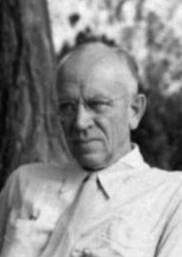“Ética é a diferenciação da conduta social da anti-social para o bem comum.”
p.238
Fonte: A Sand County Almanac, Aldo Leopold, Oxford University Press, 240pp.
Aldo Leopold foi um silvicultor, acadêmico, filósofo ambiental e conservacionista estadounidense, que, por seu extenso trabalho sobre a conservação da vida selvagem e dos espaços naturais, é considerado uma figura importante na história do conservacionismo e o fundador da ciência da conservação nos Estados Unidos.Pioneiro na elaboração de formulações éticas que buscam levar em consideração a comunidade biótica da Terra, Leopold influenciou profundamente o desenvolvimento da ética ambiental presente no movimento conservacionista. Após ter participado da fundação da The Wilderness Society, em 1935 adquiriu terras no interior do Wisconsin, nas quais pôs em prática suas inovadoras ideias sobre a restauração ecológica. Essas experiências seriam postumamente reunidas em sua obra mais importante, A Sand County Almanac. Wikipedia

“Ética é a diferenciação da conduta social da anti-social para o bem comum.”
p.238
Fonte: A Sand County Almanac, Aldo Leopold, Oxford University Press, 240pp.
"History of the Riley Game Cooperative, 1931-1939" [1940]; Published in For the Health of the Land, J. Baird Callicott and Eric T. Freyfogle (eds.), 1999, p. 189.
1940s
“An oak is no respecter of persons.”
“February: Good Oak”, p. 9.
A Sand County Almanac, 1949, "January Thaw", "February: Good Oak" & "March: The Geese Return"
“Arizona and New Mexico: On Top”, p. 125.
A Sand County Almanac, 1949, "Arizona and New Mexico: On Top," & "Arizona and New Mexico: Thinking Like a Mountain"
“December: Pines above the Snow”, p. 81.
A Sand County Almanac, 1949, "November: Axe-in-Hand," "November: A Mighty Fortress," and "December: Pines above the Snow"
“July: Great Possessions”, p. 41.
A Sand County Almanac, 1949, "May: Back from the Argentine," "June: The Alder Fork," "July: Great Possessions," and "July: Prairie Birthday"
" Game Cropping in Southern Wisconsin http://digicoll.library.wisc.edu/cgi-bin/AldoLeopold/AldoLeopold-idx?type=turn&id=AldoLeopold.ALReprints&entity=AldoLeopold.ALReprints.p0692&isize=XL", Our Native Landscape; Published by "The Friends of Our Native Landscape," October 1927.
1920s
Fonte: A Sand County Almanac, 1949, "The Land Ethic", p. 202.
“September: The Choral Copse”, p. 53.
A Sand County Almanac, 1949, "August: The Green Pasture," "September: The Choral Copse," "October: Smoky Gold," and "October: Red Lanterns"
“Wisconsin: On a Monument to the Pigeon”, p. 110.
A Sand County Almanac, 1949, "Wisconsin: Marshland Elegy," "Wisconsin: The Sand Counties" "Wisconsin: On a Monument to the Pigeon," and "Wisconsin: Flambeau"
"Grand-Opera Game" [1932]; Published in The River of the Mother of God and Other Essays by Aldo Leopold, Susan L. Flader and J. Baird Callicott (eds.) 1991, p. 172.
1930s
“The oldest task in human history: to live on a piece of land without spoiling it.”
"Engineering and Conservation" [1938]; Published in The River of the Mother of God and Other Essays by Aldo Leopold, Susan L. Flader and J. Baird Callicott (eds.) 1991, p. 254.
1930s
Fonte: A Sand County Almanac, 1949, "The Land Ethic", p. 204.
“That the situation is hopeless should not prevent us from doing our best.”
letter to Bill Vogt, 21 January 1946, quoted in Curt Meine, Aldo Leopold: His Life and Work, p. 478.
1940s
“Six days shalt thou paddle and pack, but on the seventh thou shall wash thy socks.”
"Canada, 1924"; Published in Round River, Luna B. Leopold (ed.), Oxford University Press, 1966, p. 54.
1920s
“Arizona and New Mexico: Thinking Like a Mountain”, p. 130-132.
A Sand County Almanac, 1949, "Arizona and New Mexico: On Top," & "Arizona and New Mexico: Thinking Like a Mountain"
“Wildflower corners are easy to maintain, but once gone, they are hard to rebuild.”
"Wildflower Corners" [1939]; Published in For the Health of the Land, J. Baird Callicott and Eric T. Freyfogle (eds.), 1999, p. 123.
1930s
“July: Prairie Birthday”, p. 48.
A Sand County Almanac, 1949, "May: Back from the Argentine," "June: The Alder Fork," "July: Great Possessions," and "July: Prairie Birthday"
“Wisconsin: On a Monument to the Pigeon”, p. 109.
A Sand County Almanac, 1949, "Wisconsin: Marshland Elegy," "Wisconsin: The Sand Counties" "Wisconsin: On a Monument to the Pigeon," and "Wisconsin: Flambeau"
“Wisconsin: On a Monument to the Pigeon”, p. 109.
A Sand County Almanac, 1949, "Wisconsin: Marshland Elegy," "Wisconsin: The Sand Counties" "Wisconsin: On a Monument to the Pigeon," and "Wisconsin: Flambeau"
"Cliff Swallows to Order" [1944]; Published in For the Health of the Land, J. Baird Callicott and Eric T. Freyfogle (eds.), 1999, p. 119.
1940s
"Preface".
1930s, Game Management, 1933
"Chukaremia" [1938]; Published in The River of the Mother of God and Other Essays by Aldo Leopold, Susan L. Flader and J. Baird Callicott (eds.) 1991, p. 246.
1930s
“November: Axe-in-Hand”, p. 68.
A Sand County Almanac, 1949, "November: Axe-in-Hand," "November: A Mighty Fortress," and "December: Pines above the Snow"
" The Deer Swath http://digicoll.library.wisc.edu/cgi-bin/AldoLeopold/AldoLeopold-idx?type=turn&entity=AldoLeopold.ALDeskFile.p0799&id=AldoLeopold.ALDeskFile&isize=L" [1948]; Published in Round River, Luna B. Leopold (ed.), Oxford University Press, 1966, p. 127.
1940s
"The Arboretum and the University" [1934]; Published in The River of the Mother of God and Other Essays by Aldo Leopold, Susan L. Flader and J. Baird Callicott (eds.) 1991, p. 210.
1930s
“Engineers did not discover insulation: they copied it from these old soldiers of the prairie war.”
“April: Bur Oak”, p. 27.
A Sand County Almanac, 1949, "April: Come High Water," "April: Draba," "April: Bur Oak," & "April:Sky Dance"
"The Conservation Ethic" [1933]; Published in The River of the Mother of God and Other Essays by Aldo Leopold, Susan L. Flader and J. Baird Callicott (eds.) 1991, p. 191.
1930s